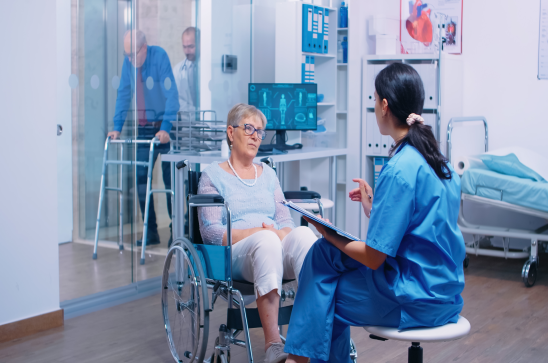Tired of navigating the complex healthcare system alone? We get it. That's where Patient Care Assistants (PCAs) swoop in as your healthcare heroes!
PCAs are super important in healthcare. They give necessary care to patients, helping them stay healthy. Their job can be tough, but it lets them make a big difference in how people feel. These dedicated healthcare professionals take on the important task of reporting and analytics, contributing significantly to the overall well-being of patients.
In this guide, we're diving into the ins and outs of the role, helping you unlock the secrets to seamless healthcare experiences. Ready to make your health journey stress-free?
What Is A Patient Care Assistant?
In healthcare, a PCA works closely with nurses to care for people. They watch over patients and do basic things like feeding, bathing, and dressing. In hospitals or places where people get help, PCAs are really important. They work with other caregivers, like nursing attendants, to give good healthcare.

Being kind and patient is also the key. These traits help PCAs make a safe and caring space for patients, looking after both their body and feelings. People call PCAs by different names, like patient care technicians or nursing aides. Regardless of what they are called, they are crucial in healthcare, working together with licensed nurses to make sure patients get the best care and stay healthy.
Patient Care Assistant Roles And Responsibilities
PCAs have lots of important jobs in taking care of patients. They help with basic patient care like washing, dressing, and helping with the toilet. They make sure patients eat properly too. Doing these tasks shows they care about the patients which helps them to feel good.
Checking vital signs is another vital job for a PCA. They regularly check factors like temperature, pulse, and blood pressure. This helps keep track of how a patient is doing health-wise. It’s like being proactive and catching problems early.
PCAs also do lab tasks during their clinical work. This role needs some learning in an education program and some training on the job. Passing a state test and getting on the state list show they’re good at patient care.
Patient Care Assistants work in different places, like nursing homes. They really contribute towards making a difference in residents’ lives. Hence, PCAs get paid a good salary because their role is quite important. Patient care assistants also shoulder the responsibility of handling payment postings, showcasing their multifaceted skill set that goes beyond clinical duties.
Job ads always mention needing people who are good at the technical stuff and are friendly too. The U.S. Bureau of Labor Statistics says there’s a growing need for skilled people in this field. That indicates that the PCA role is of undeniable importance.
To sum up, being a Patient Care Assistant is about more than just technical healthcare stuff. It’s also about being friendly and caring for patients. PCAs are a vital part of the healthcare team, making patients feel better and healthcare work well.
Patient Care Assistant Requirements
When it comes to being a Patient Care Assistant (PCA), it’s important to understand what you need. The U.S. Bureau of Labor Statistics says that becoming a good Care Assistant requires learning, getting certified, and getting practical experience.
To start this rewarding career, you need to go through a program approved by the state. This program teaches aspiring PCAs what they need to know and helps them get good at their jobs. They learn both in the classroom and by doing real work with patients.
Also, hands-on training is an important part of getting ready. This type of experience lets PCAs use what they’ve learned in real situations. After finishing training, they have to pass a test to show they’re good at their job. If they pass, they’re listed on a state registry, which means they’re officially qualified Patient Care Assistants.
Being a PCA isn’t just about knowing technical stuff. To be good with people is just as important. Also to be understanding, wanting to help, and working well with a team are really important traits. Patience is super important, especially when things get stressful. PCAs need to stay calm and handle challenges with a cool head.
Getting feedback is seen as a chance to get better, showing how important it is to always improve. Paying attention to details is a big deal, making sure every part of patient care is done carefully. Also, being great at customer service and talking well with others helps build strong connections with patients and their families.
In today’s healthcare world, knowing how to use technology is a must. PCAs need to be good with computers and handheld devices to do their job well. This tech knowledge is part of the many skills PCAs need, making them valuable members of the healthcare team.
In-Demand Skills for Today’s Patient Care Assistants
PCAs need good communication and people skills. They must be kind and caring while working fast in healthcare. Talking to both patients and the healthcare team is important for creating a caring environment.
Having a Basic Life Support (BLS) Certification shows a PCA cares about their patients. Knowing how to use electronic health records (EHR) systems helps with accurate and quick documentation.

The need for PCAs has created groups like Alina Homecare and Bluebird Care Bournemouth and Poole. They offer training and online courses for new PCAs. PCAs make a positive impact on people’s lives and show the caring side of healthcare.
To do well, PCAs need personal traits like empathy, patience, and staying calm in tough times. They must handle pressure, accept feedback, and pay attention to details. PCAs also need to be good with technology, using computers and devices for modern healthcare.
Best Industries for Patient Care Assistants
In healthcare, patient assistants are important in different jobs. They help people in many places. The best industries for these helpers in the United States are found by looking at the percentage of jobs in each.
Nursing Care Facilities, also called Skilled Nursing Facilities, are a big part, making up 33.2% of jobs. These places have experts working with helpers to give good care. General Medical and Surgical Hospitals are next, with 25.2% of jobs. Helpers in these fast places give important support to patients getting treatments.
Continuing Care Retirement Communities and Assisted Living Facilities for the Elderly are another important area, with 10.6% of jobs. Helpers in these places give special care to older people, making a nice and helpful space.
Home Health Care Services, at 6%, is where helpers play a big role by giving healthcare straight to people in their homes. This area needs helpers who can adapt and give special care in different homes.
Employment Services and Education and Hospitals (Local Government) each have 3.8% of jobs. This shows that helpers have different chances in these areas. Employment services match skilled helpers with places that need them. Local government education and hospitals give a special place for helpers to help the community.
Looking at the bigger picture, there’s a 17.4% share in ‘Other.’ This includes different healthcare places, each with unique challenges and chances for helpers to do well. Data from 2023 shows that helpers can do well in many industries. They are important in shaping the future of caring and personal healthcare in the United States.
Apart from that, discover how clinically integrated networks revolutionize medical billing. Boost efficiency with our expert insights.
Most In-Demand Patient Care Assistant Jobs
In healthcare, patient care assistants are super important.
One cool job is Certified Nursing Assistants (CNAs). In 2023, there were lots of job postings—48,381! These folks are really wanted and do a big job in healthcare. They help patients and the whole medical team.
Another cool job is Home Health Aides. In 2023, there were 42,635 job postings. They do a big job, too. They give healthcare in people’s homes, which is nice and comfy. Personal Care Aides also do important work. In 2023, there were 32,811 job postings for them. They take care of people in a kind and special way.
Medical Assistants are important, too. In 2023, there were 27,861 job postings for them. They do lots of different tasks in clinics and medical offices. Nursing Assistants, with 24,182 job postings, do hands-on help in patient care.
Pharmacy Technicians and Phlebotomists connect patient care and medicines. In 2023, there were 22,715 and 19,402 job postings for them. They make sure everything works well in healthcare.
Emergency Medical Technicians (EMTs) are like heroes. In 2023, there were 18,928 job postings for them. They help in emergencies and save lives. Occupational Therapy Assistants (OTAs) and Physical Therapy Assistants (PTAs) also help people live better lives. In 2023, there were 17,892 and 16,532 job postings for them.
To start a cool career in these jobs, you can get certified. You can do this at a community college, vocational school, or online. Make your resume and cover letter show your skills. Join events like job fairs and conferences to meet people in healthcare.
When you go for an interview, be ready to answer questions. Show you want to keep learning and use your skills. This will help you get a job in one of the best industries for patient care assistants.
The need for patient care assistants is growing. More people need help, and healthcare is changing. If you join these fields, you can have a great job and help people in many different places.
Final Thoughts
To sum it up, healthcare is unimaginable without the PCAs. Being a PCH needs learning, practice, and personal qualities. It’s a good but tough job.
As more people need PCHs, those in this job help a lot in making lives and health better. Their needed skills, and growing demand in the employment sector show how important they are for now and in the future.







 8 mint read
8 mint read